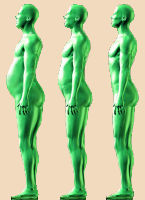Lighten Up
 I've gotten to talk about my AZ Trail hike with a few scout troops and groups over the past month. The most common question I'm getting is how to lighten a pack for a backpacking trip.
I've gotten to talk about my AZ Trail hike with a few scout troops and groups over the past month. The most common question I'm getting is how to lighten a pack for a backpacking trip.I tell about all the ways I cut out ounces and pounds from gear, staying safe and comfortable and making smart choices. I save the best tip for the end. It costs nothing, saves your body work, and makes a larger impact than all the other gear tweaking you can do.
I reduced my pack weight from around 40 pounds to around 25 pounds by making a light shelter, quilt, and pack, reducing redundancies, and purchasing a few lightweight items. That includes food and water, so carrying less water and stopping more often to fill up water can make your pack even lighter. I removed about 15 pounds from my pack that I didn't have to lug from Mexico to Utah.
During my 6 weeks on the trail, I lost about 14 pounds. Most of that was in the first 2 weeks and then I stabilized as I got used to eating, hiking, and sleeping. Just by losing weight off my body, I nearly reached the weight savings that I got from all the gear tweaking I did!
GoiPlanning a trek with the idea of "This will be a great way for me to lose a few pounds!" is NOT a good idea. Your body will need calories to function properly on the trail and holding back the food it needs will cause you to be weak and increase the risk of injury. If it's a long trek, you will most likely lose some weight anyway, but that should not be your plan. I lost weight because I did not force myself to eat as many calories as I was burning each day - I should have eaten more.
A better idea is to lose some weight before a trek. For two or three months before your backpacking trip, while you're doing practice hikes and getting physically ready, cut back on the ice cream, hamburgers, soda, chips, and all that other fattening stuff. The increased physical exercise will burn from 100 to 150 calories per mile, depending on your body and pack weight. Since there's about 3500 calories in a pound of fat, you'll need to hike around 350 miles to remove 10 pounds of fat. More than you thought, huh?
That fat won't burn off if you increase your food consumption. "Hey, I hiked 6 miles. I can have a second bratwurst" will stop you from losing any weight. Self-discipline is the key to long-term weight lose - that or a personal trainer.
However you do it, losing weight before starting a backpacking trip or long hike is the best way to reduce the complete package you need to haul over mountains and valleys. Besides, you'll be a better role model and more ready to take on any other challenges that come along.
Scout On
Posted: 13:42 06-30-2012 870
Comment or Question about this page:
Scouting 2025 - Ask a Question - Add Content
Just for Fun: Socializing merit badge




This site is not officially associated with Scouting America
Find more Scouting Resources at www.BoyScoutTrail.com



Follow Me, Scouts
Recent Comments